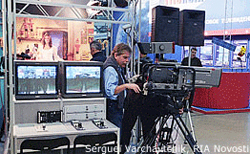Influence of Moscow TV Declining But Working Overtime against Russia, Panov Says

(Paul Goble – Window of Eurasia – Staunton, August 14, 2019)
Two weeks ago, the Levada Center issued a report suggesting that the influence of Moscow television on younger Russians is declining at a precipitous rate, thus depriving the Kremlin of one of its most reliable means of influencing Russian public opinion (levada.ru/2019/08/01/21088/).
But now a Russian commentator, Valery Panov, argues that the situation is even worse: Not only are young Russians paying less attention to Moscow television than they did, but when they do watch it, they often take more from the advertisements which fill 20 percent of broadcast time than from the programs (stoletie.ru/obschestvo/televidenije_bjet_po_svoim_255.htm).
And those advertisements in subtle ways introduce Englishisms and Americanisms in ways that undermine the message of the intervening programs, win over the hearts and minds of young Russians, and give an ideological victory to the West that it does not deserve and an ideological defeat to the Kremlin that it does not appear to recognize.
Panov offers the case of one young Russian with whom he spooke whose vision of Russia today and of its future sound more like those of Kremlin critics than Kremlin supporters even though he regularly watches First Channel and Russia-1 and “trusts them more than the Internet.”
“In such cases,” he says, “one usually says that with friends like these, one doesn’t’ need enemies, since precisely ‘such friends’ who know well the situation from the inside will hit at the most sensitive places.” But their comments should not be dismissed: They highlight an unexpected reality:
“TV is destroying the mass consciousness of Russians no less seriously than the anti-Russian propaganda of the West.” (stress supplied)
Advertising on Moscow TV takes up 20 percent of the time, and it has become part of the social milieu” of Russians even though most of it is produced by trans-national corporations with only the most necessary parts being translated into Russian. The rest is typically in English – and the values are certainly those of the West, not of Russia.
Perhaps still worse, Panov continues, in these commercials, “Russian speech is presented with distortions of all norms and rules. (This point has also been made by two Russian television personalities during a recent program with commercials — politikus.ru/video/121776-cherez-angliyskiy-yazyk-idet-podchinenie-soznaniya.html.)
“Americanization” has taken over Russian television to the point, the commentator continues, that “I think this has become one of the threats to the national security of Russia. Perhaps, we need to fine channels for using foreign words” as is done in Spain or in Ukraine “for the use of Russian.”
It is understandable that “television is a business, the main goal of which is to gain a profit by any means just as in any other sphere of free enterprise,” Panov says. But television plays an outsized role in Russian life and therefore something has to be done to redress the balance which now exists.
“In fact,” he continues, “the television of Russia has been reduced to two simple formulas: the advertisement of good and propaganda,” political and otherwise. Consequently, it promotes what sells and reinforces it, such as the cult of force that has spread from the box to society at large.
Panov suggests that things have gotten to the point that “the Americans and Europeans should long ago have stopped spending money on the creation of various structures directed at opposing ‘the influence of Russia.’ For them, Russian television is doing this very well” and using Russian means to do so.
“It seems to me,” the Moscow commentator says, “that the role and significance of television in such an important task as the consolidation of society is being underrated in Russia.” It remains the chief source of information even for those who turn to the Internet – and they are still a minority.
But – and this is what matters most of all – “Russian television as is the case throughout the rest of the world long ago already ceased to be only a means of mass information but a powerful system of programming the consciousness of millions of people, an instrument for the control of their behavior, a world of psychological compensations, a source for amusement, and the main factor of the formation of any ideas about life.”
There is the famous poem of World War II writer Aleksandr Mezhirov who muses when Soviet artillery shells by mistake Russian lines as to who might have given them the wrong map coordinates, Panov says. What’s happening with Russian TV forces one to ask who is giving it coordinates which are causing this channel to hit the wrong people in the wrong way.
[Article also appeared at windowoneurasia2.blogspot.com/2019/08/influence-of-moscow-tv-declining-but.html]
[featured image is file photo from another occasion]
